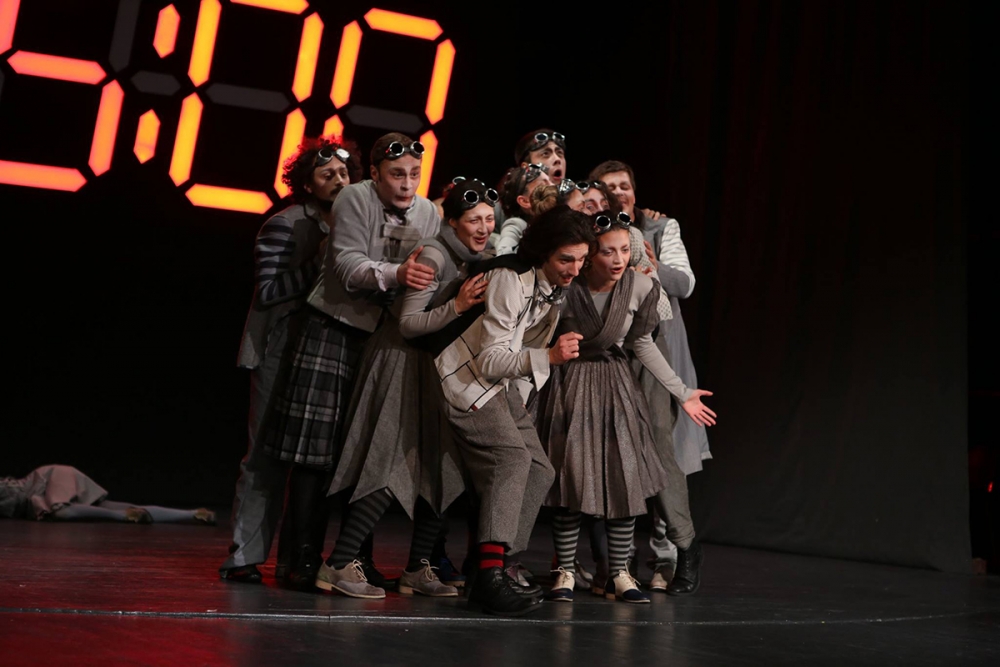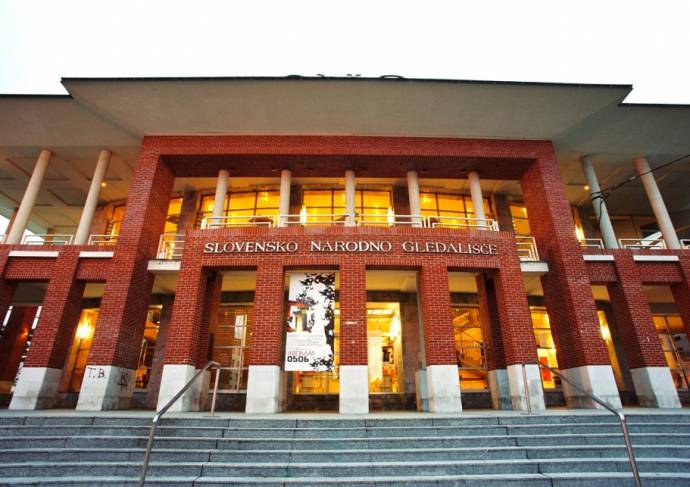While I was waiting
Directed by Omar Abusaada
Thursday 6 October at 19:30
Taim was brutally beaten under mysterious circumstances after crossing one of the security checkpoints widespread in Damascus. He was admitted to the hospital unconscious. The doctors informed his family that he was comatose. This tragic event compels family members to face painful challenges and revelations, buried during the past years. After surviving their father’s death in 2000 and the scandal it revealed, the family seems unable to overcome the new shock in 2015 of Taim’s coma without undergoing fundamental changes. Over the course of a year, Taim, still in a coma, observes the transformations in the lives of his family members and close friends—as well as those of his city, Damascus, which is becoming crueler and stranger.
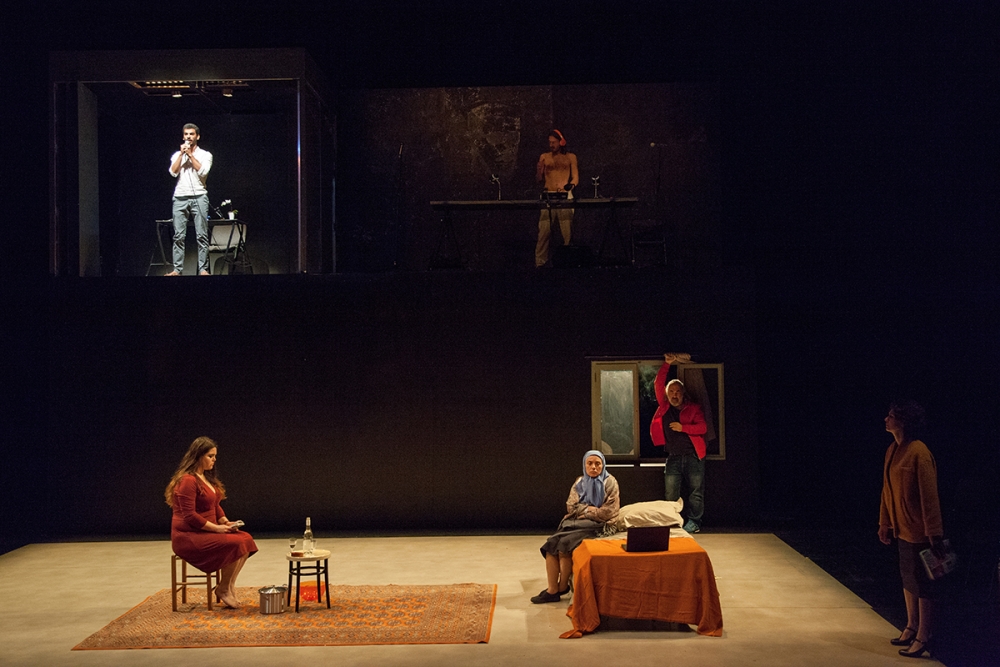
We are the ones our parents warned us about
Directed by Mirjana Karanović
Friday 7 October at 18:00
We Are the Ones Our Parents Warned Us About is a drama that twists the concept of role-play, as well as all other narrative techniques it uses, both the monologue and the dialogue, as well as the language itself, into their opposites, and demonstrates the impossibility of a simple attempt – to tell a story about one's own lives to an unknown person in the span of one night. In June, in a public toilet, Mara, a woman in her forties, and Milan, still a teenager, celebrating his birthday that evening, (accidentally?) meet and attempt to tell each other about their own lives. They use random inscriptions on the toilet wall as triggers for memories, and the unreliability and volatility of any corporeal, emotional, or mental memory are presented as the only truth one can tell about his/her-self through four scenes in which they play the archetypal relations of mother-son, father-daughter, brother-sister, and lover-lover.
When I read this text for the first time, I was overwhelmed with emotions emerging from it. I recognized the layers of my soul in it. My sadness, fears, desires, emptiness that remain after the people I once loved. I recognized in it all of the creatures living side by side within me. The girl, craving her father’s attention, the emptiness of a mother who no longer has her son, the immense love of a sister toward her brother, and the desire of a mature woman for life. - Mirjana Karanović
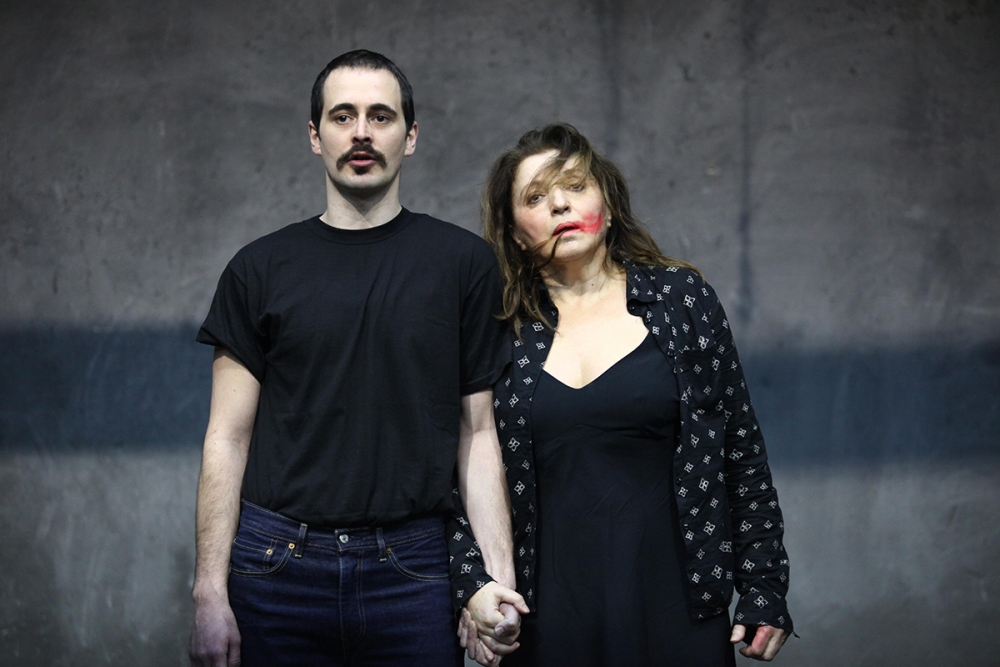
The Patriots
Directed by Andras Urbán
Friday 7 October at 19:30
Sterija told his contemporaries the following, “Beware of those who never stop speaking about patriotism; do not believe that loving one’s own nation means being blind to its faults and sins, and hate barbarically all people of other race and creed; stay away from fatal self-delusions, and hate the lie with all your souls, because the truth is our first duty to our nation; because, ultimately, the truth is the highest moral and the most powerful tool of progress.” The Patriots has special importance; it is a piece of strength and reason, a result of Sterija’s spiritual and literary maturity, a bitter satire of false and phraseology patriotism… a work of a witty spirit, an ironic observer and rational patriot, and as a socio-political representation of a period goes together with the best works of its kind in Serbian literature.
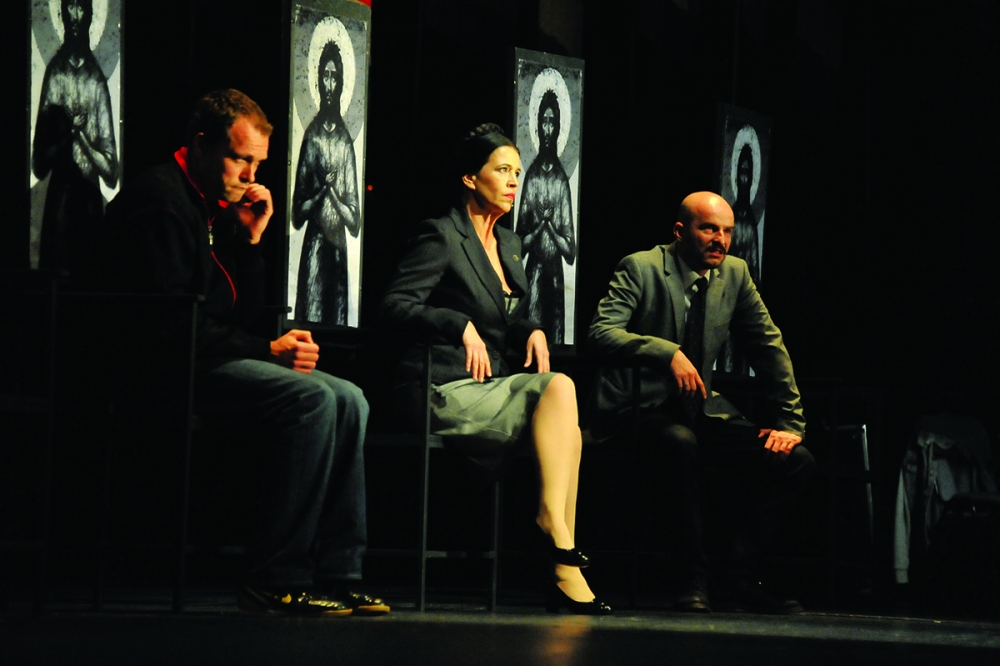
Frog
Directed by Elmir Jukić
Thursday 7 October at 22:00
The Frog is a story about each and every one of us; about the age of misunderstanding, loneliness and the pursuit of love and meaning. The play, with almost surgical precision, makes a diagnosis of the time we live in. Its characters are not able to cope with the transition and the change of values. The problems it addresses are the same or of fairly similar nature, be it in Bosnia and Herzegovina, Croatia or Serbia. One of the main issues is the lack of communication and the inability to hear other people's opinions. The play has an excellent point to it: we tend to blame others for the bad things that happen to us, failing to seek ways to change them ourselves. The bad quality of life and the situation we are in, make us place responsibility on the government, the system, our boss, the manager of the company we work in, the supervisor, the coach or the head of the team, and not ourselves. It is important to get involved in our own destinies and stop feeling sorry for ourselves. The Frog is a text written by a younger generation author, Dubravko Mihanović, from Zagreb. He won numerous awards for it, one of them being the Marin Držić Award for the Best Dramatic Text in 2004. The play has been performed for seven years in the Chamber Theatre 55 and, on 19 September, 2015, it was officially performed for the 200th time. It has won numerous awards, both in Bosnia and Herzegovina, and in the region.
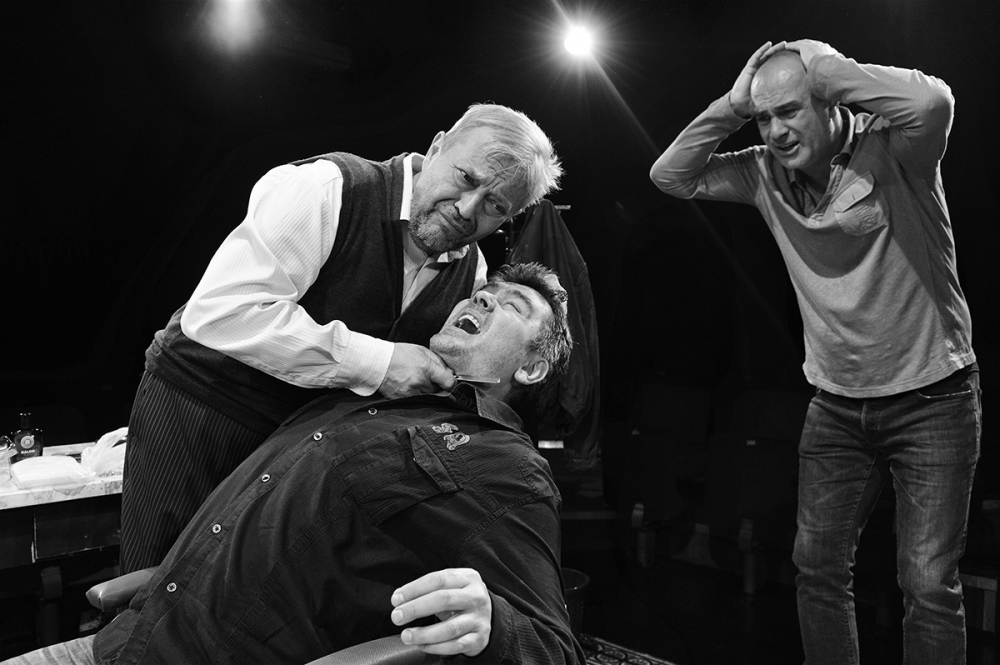
Katër i Radës
Directed by Salvatore Tramacere
Friday 7th October at 22:00
Katër i Radës is not just an opera of the memory. It’s an effort to portray, though music, the universe of the people who were faced with one of the many tragedies in the Mediterranean: the one of a small Albanian boat overloaded with men, women, and children, which sank in March 1997 in front of the Italian coast. In a single act, cramped are the Drowned and the Saved, those who survived and those who died, their voices, their thoughts, and especially their journey into the dark, full of great anxieties and small wishes, dreams and fears, digressions, apparitions, sudden recollections.
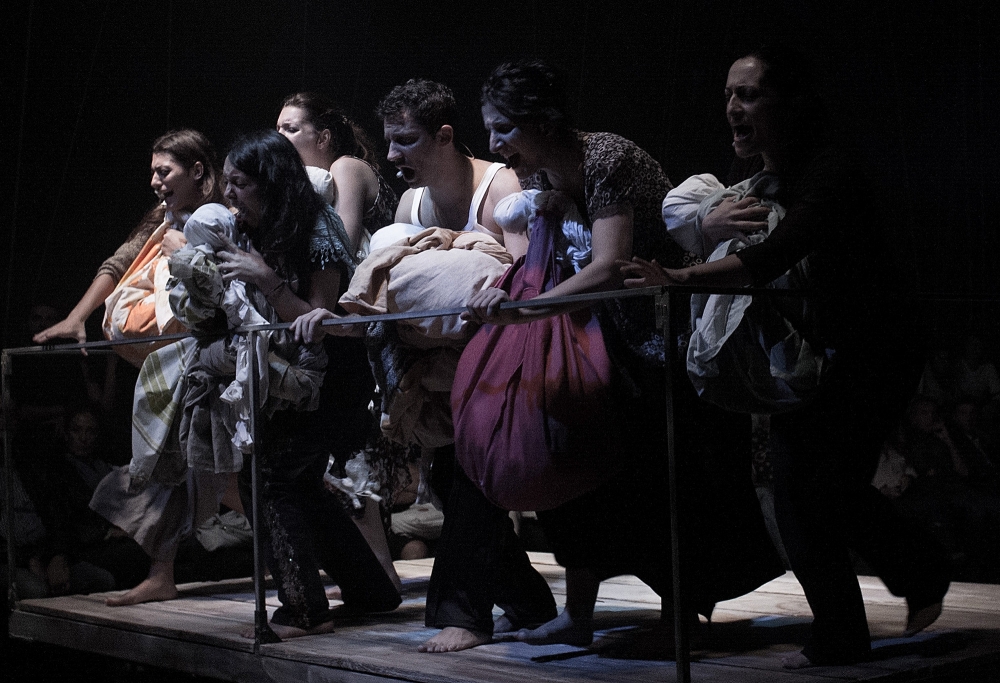
Three Winters
Directed by Salvatore Tramacere
Friday 7th October at 22:00
The drama Three Winters follows the destinies of strong women from four generations connected to one house. Tena Štivičić took a story from her own family as the starting point of her drama, inspired by the hard life of her great-grandmother who gave birth to an illegitimate child during the Kingdom of Yugoslavia. In the winter of 1945, as per the party decree, a mother and a daughter with her husband and a new-born baby girl move into the mansion of an NDH immigrant. The house sto be empty, but it hides one remaining tenant and the mother's old acquaintance. In the winter of 1990, the Kos family gathers in the same house after the funeral. It's the time just before the Homeland War, the new country is still in its infancy, and former divisions and old controversies are surfacing again. In the winter of 2011, a wedding is being prepared in the house and the Kos family is together again. On the eve of joining the European Union, certain family chapters are being closed and long silences are being broken, while the new powers guided by the ideology of capital determine the fate of the house in which years and memories are still being deposited…
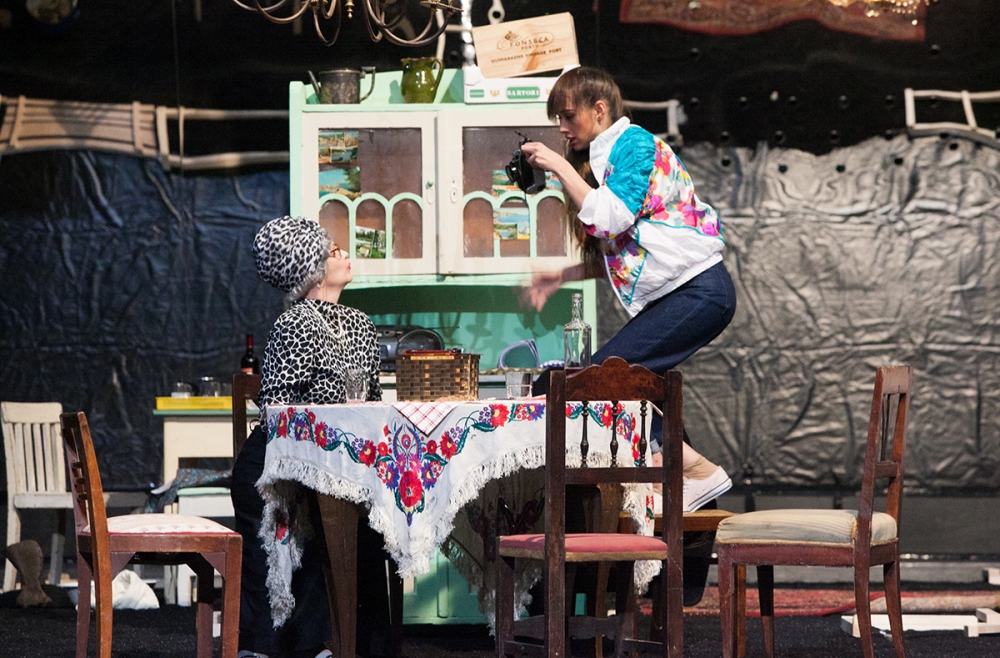
What would you give your life for?
Directed by Haris Pašović
Saturday 8 October at 22:00
The idea for this performance was born in my Acting master classes at the Academy of Arts in Novi Sad a few months ago when I was working with drama students. We worked on the theatrical portraits of several people who gave their lives for their ideas. I asked the actors, all in their early 20s, what would they give their life for? When we put aside the family that most people would sacrifice their lives for, the question is whether there exists an idea or a project that we would give our lives for? That is how this extremely exciting process began in which we considered ideas, philosophies, beliefs, and, in parallel, also investigated new theatrical forms. Ours is the Age of Universal Communication which changes the paradigm of our communication. Who are the identities that communicate in virtual space? The storytellers in our performance are the entities behind IP addresses; it is less important who and where they are than what they are saying. Their identities communicate in a virtual intellectual space/time. People they talk about appear and emerge in a mental space of a group of identities that communicate. Each identity has access to the totality of the story, follows it, and co-constructs it with its own contribution. This may sound complicated, but it is not. It is a contemporary discourse that goes beyond the traditional dramaturgical forms, as they are insufficient for the new paradigm we live in.
We create an intellectual theatre, but not one alienated from the viewer regardless of his/her education or erudition. Our theatre is accessible to everyone; ideas belong to everyone.
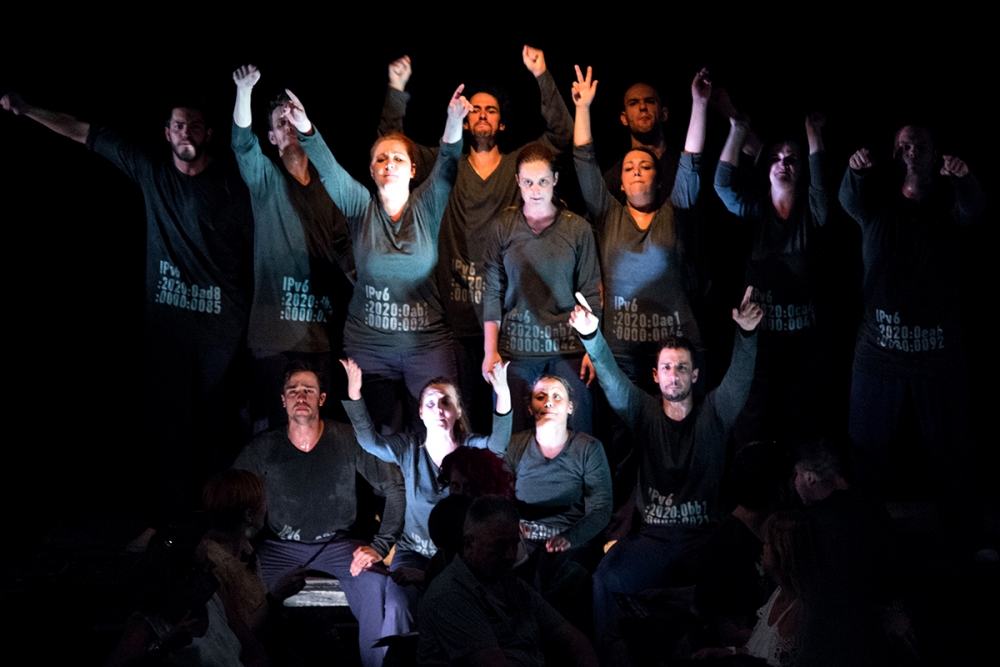
What is Europe?
Directed by András Urbán
Sunday 9 October at 18:00
Europe is a utopia. With its name we often associate cultural, historic, and humanistic values, rule of law, appreciation and importance of quality life. The road to Europe is an imaginary road to a better tomorrow and happier future. However, that future cannot be seen on the horizon.
From the perspective of complete outsiders, some of us secretly desire that the global political changes will bring about the breakup of the European Union, in the similar fashion they brought about the breakup of Yugoslavia in the ninety eighties. Europe will not break up. It may transform and reshape itself, embracing new, not necessarily positive values. The far right sees the settlement of Europe by non-Europeans as an assault on European identity. Fear. Radical actions. Terror. Defense. Questionable is the desire for integration, as is the possibility of such a community to succeed. The rules are clear. If you live here, you live by our laws. The rules are not clear. There is no integration. There is only assimilation or failure. Life changes…and the world does, too.
The play is based on three essays by Laszlo Vegel, collectively published under the title Stories from the Lower Areas, as well as on the exercises and improvisations the actors had thought out within the theatrical process. Theater is above all fun. The knowledge of a self. What is Europe is a question. What is Europe is an answer. There is no ultimate victory. The unburied corpse of Yugoslavia is staring at us folks populating the border areas of the Barbaricum.
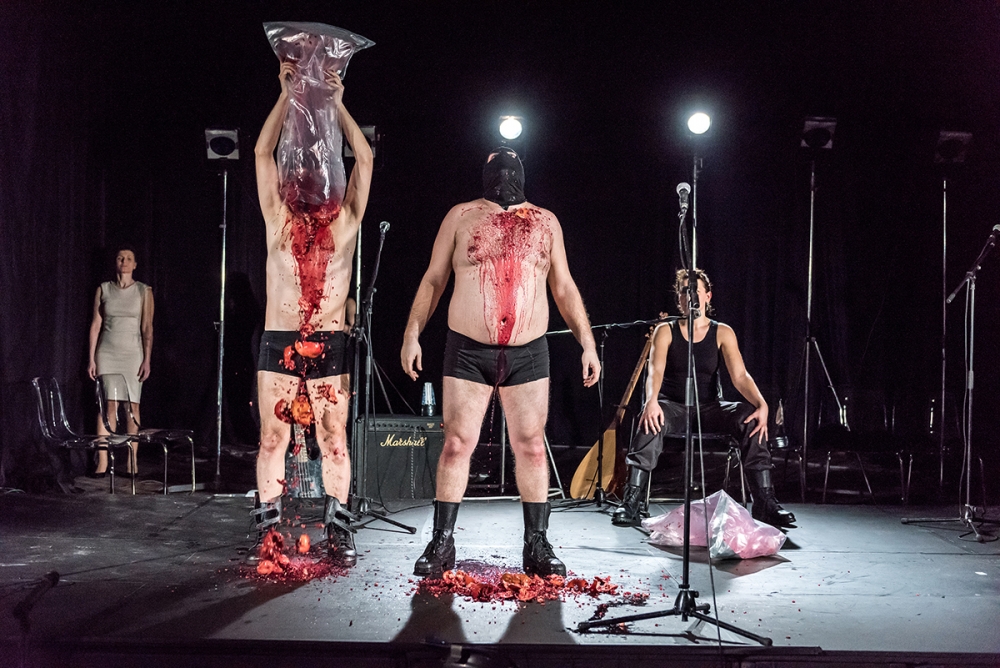
Our violence and your violence
Directed by Oliver Frljić
Sunday 9 October at 19:30
The play Our Violence and Your Violence observes Europe naively stunned by the refugee crisis, Europe which willingly forgets its colonial past and as willingly closes its borders to thousands who run from the consequences of the American and European politics. The twentieth century seems like it has persistently worked on encouraging national narcissisms which taught one mass that it is better than the others. Twenty-first century continues with the same lessons, using the infallible weapon: fear. The image of strong, bright Europe is eroded by a growing paranoia and the message comes at us from every corner: you are no longer safe, anywhere. The fear is, indeed, the safest prerequisite for hatred.
Are we aware that our prosperity depends of thousands of dead in the Middle East? In the moment of one of the world’s greatest crises after the World War II, should we proudly call ourselves Europeans or should we be ashamed of Europe? Are we ready to bear the consequences of the hundred-year long European domination? Do we mourn the same for victims of terrorist attacks in Paris and Brussels, as for those in Baghdad? At what moment did we start believing that we are the masters of truth and that our God is more powerful than other Gods? And where in all this are we, the audience, while we cry in a dimly-lit hall, watching scenes of fiction, yet we remain indifferent before real people in refugee camps?
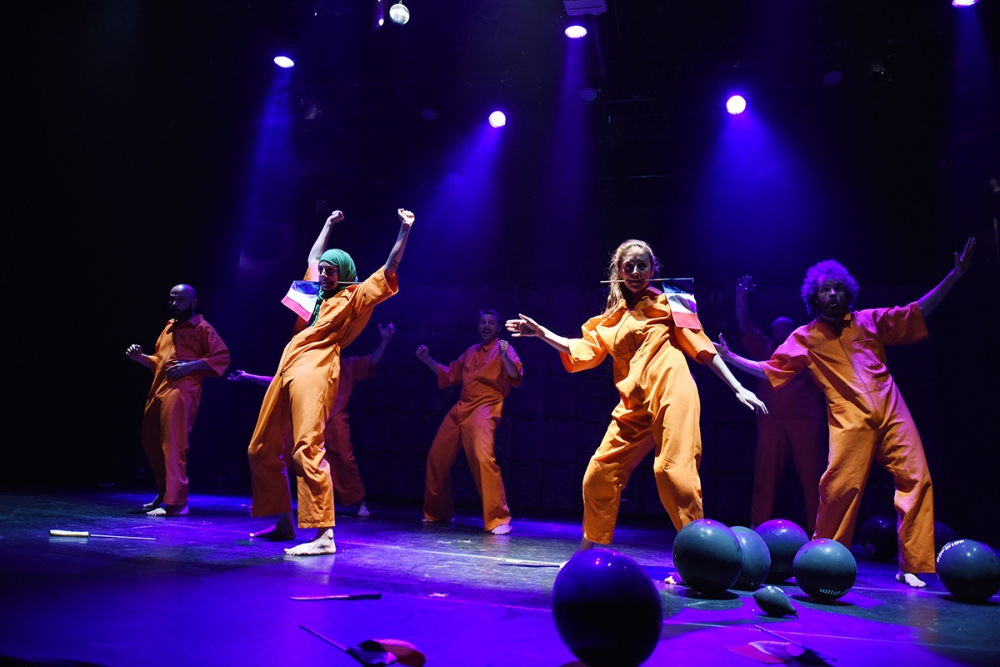
Einstein’s Dreams
Directed by Slobodan Unkovski
Sunday 9 October at 22:00
The performance Einstein’s Dreams inspects various aspects of time and displays its relativity through an array of playful worlds. In some of those worlds time flows backwards, while in others it is circular. Sometimes it flies, other times it doesn’t flow at all. To some people, life lasts only for a day, and to others – an eternity. In some of those worlds, life repeats itself countless times, while in others it divides in several parallel directions. The inhabitants of these worlds leave the impression of being parts of some strange mechanism, or some kind of puppets who are able to move, speak and act, but instead of acting in accordance with their own will, they are controlled by their master – the Time. There are moments when we can feel their desperate attempts to take their destiny in their own hands and to seize the time. However, the time is always beyond reach and sets its own rules. Some may recognize parts of themselves in these unreal characters, or images of their life and their reality in this patchwork of different worlds.
